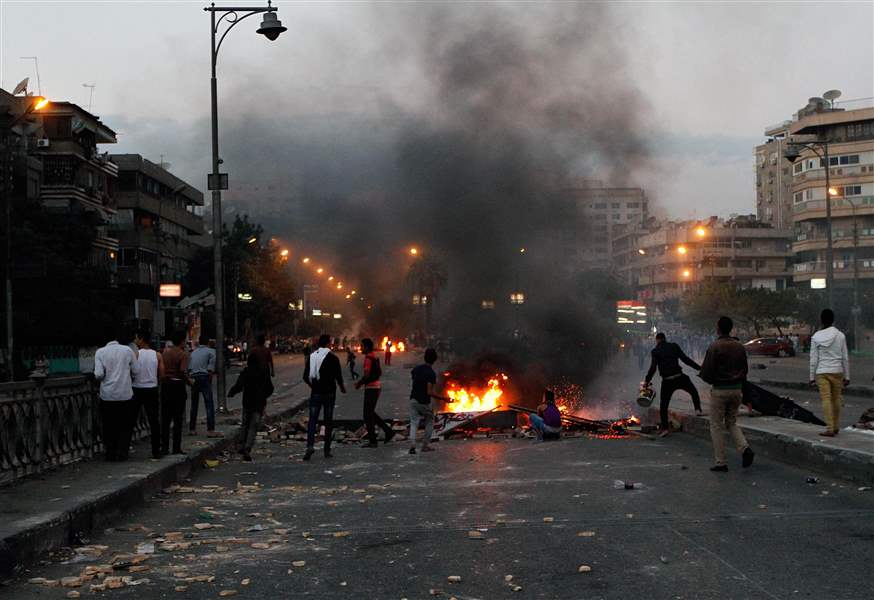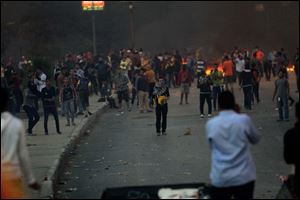
Egypt's president issues law regulating protests
11/24/2013
Protesters against the Muslim Brotherhood, front, throw rocks towards supporters of the Muslim Brotherhood in the Nasr City district in Cairo, Egypt, Friday, Nov. 22, 2013. Clashes erupted Friday as thousands of supporters of the Muslim Brotherhood around Egypt held protests marking the passage of 100 days since the start of a bloody crackdown against them in the wake of the ouster of the Islamist President Mohammed Morsi. The violence left at least two dead including a 10-year-old boy. (AP Photo/El-Shorouk newspaper, Sabry Khaled) EGYPT OUT
ASSOCIATED PRESS

Supporters of the Muslim Brotherhood, background, throw rocks towards the security forces and those against the Muslim Brotherhood in the Nasr City district in Cairo, Egypt, Friday.
CAIRO — Egypt’s interim president issued a new law today regulating protests, weeks after the much-anticipated bill stirred serious criticism from rights and political groups that say it will undermine freedoms and stifle all opposition.
Drafts of the bill have been widely debated since the military-backed government first floated it in October. Interim President Adly Mansour approved an amended version today and it will be released later, presidential spokesman Ihab Badawi said.
The law comes 10 days after authorities lifted a three-monthlong emergency order that granted security forces sweeping powers.
Rights groups and political forces say the law is designed to restrict protests and will have a negative impact on rights and freedoms in Egypt.
Egypt has been hit by turmoil and perpetual protests for nearly three years since the 2011 uprising against autocrat Hosni Mubarak. The turmoil intensified after the popularly backed July 3 military coup that removed Mohammed Morsi, Egypt’s first democratically elected president. Morsi supporters have organized near-daily protests since his ouster.
The bill as initially drafted required prior notice for protests and set high fines for violators. An amendment later reduced the period of notification to three days, banned spontaneous assemblies and kept high fines.
The amendments still granted security agencies the right to bar any protests or public gatherings, including election related meetings of political parties. Under them, the security agencies can ban a gathering if it received information that it threatens public safety or order, without specifying the nature of the information or the threat.
It also bars gatherings in places of worship, a regular meeting place for all protests in Egypt in the past three years and one heavily used by Islamist groups.
Nineteen rights groups say the law, despite some amendments suggested by court, seeks to criminalize all forms for peaceful public gatherings. They say it “continues to reflect the same oppressive vision, which looks upon peaceful assemblies as being an offense in the making” by imposing “unreasonable” restrictions.
The amended draft says the police have the right — following warnings — to use force as it sees fit, including the use of water cannons, tear gas and clubs.
The groups say the law gives police forces unrestricted use of birdshot to put down protests, omitting an article that prohibited the use of force in excess.
“Such an omission is the most serious indicator of the real intentions of the current authorities, which claim they are seeking to legalize and regulate peaceful assembly, while this actually is yet another attempt to legalize repression,” the groups said in a statement Friday.
The pro-Morsi protests have decreased in size since a government crackdown that landed many of the leaders of Morsi’s group, the Muslim Brotherhood, and his allies in jail. Bloody crackdowns on protests also killed hundreds.
Security officials accuse Morsi supporters of organizing retaliatory attacks against government offices, police, military troops and Christians, considered supportive of the military, to destabilize the country.